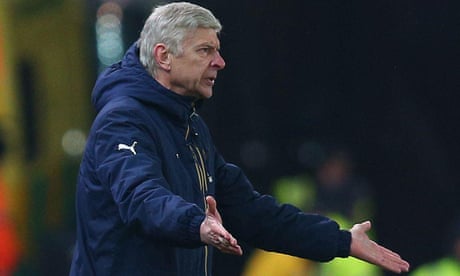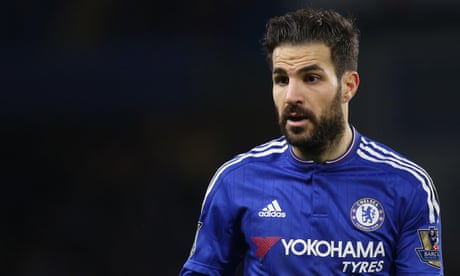
Arsenal have benefited from Mesut Özil’s rejuvenation within the side and his strong leadership qualities. Photograph: Julian Finney/Getty Images

Arsenal’s near future title bid means more than history with Chelsea
Perceptions about Özil have been revised over the past year. Where his languid body language made critics carp, now it represents clever, elusive movement. Where opposing defenders sought to rough him up and squeeze him out of the game, now they know he is strong enough to handle it and slice them open. Where fans doubted he would be the protagonist in the biggest challenges, now they expect him to wave his wand.
Arsène Wenger, grateful to welcome Özil back into his team after skipping two out of the last three games (he took a breather for the FA Cup third round and rested his sore toe for last weekend’s trip to Stoke) gave an interesting insight into how the 27-year-old has become an unexpected leader in his own way at Arsenal. He will never be a shouty commander but on the pitch he is a technical leader and off it emits the kind of presence that ensures when he talks, everyone listens.
“He’s not an extrovert, as you know,” says Wenger, “but he’s demanding from his partners.” That description applied to Dennis Bergkamp, and the comparison made Wenger’s eyes light up. Bergkamp was a huge figure in the dressing room in his time. He could be an introvert but was also funny, sharp, observant, and spoke with piercing accuracy. “Yes, Özil is a bit like that,” adds Wenger. “He is not that guy who stands up and speaks too much but every time he says something it is just straight to the point.” The manager snaps his fingers for emphasis.
Going back to Bergkamp, there is the story of Tony Adams feeling a compulsion to say a few strong words to the Dutchman when he saw him sitting quietly on the team bus after an FA Cup fourth-round match at Middlesbrough in January 1998. “You’ve been here two and a half years now, Dennis, isn’t it about time you won something?” Adams asked. “It would be a shame not to, with your ability.”
Come the summer of 1998, Bergkamp had inspired Arsenaltowards the double and was voted Footballer of the Year. Adams’ point was that he wanted to push Bergkamp, to elevate his performances so that they had substance as well as style. Do the damage. Make the difference.
Özil appears to have had his own eureka moment. As well as being more robust, the consequence of extra work at the gym to bulk up during that post-World Cup lay-off, these days he carries himself with more swagger. He now wants to do the damage. Make the difference. “I am super happy with the No10 position and I will confirm that trust,” Özil pledged on this season’s eve. So far he has been true to his word.
When he was shunted out of Real Madrid in 2013 as they sought to raise funds to buy Gareth Bale, maybe it is understandable if he saw the move to Arsenal as a step down, something that would be easy. To thrive, he needed to reboot himself. Arsenal’s Özil 2.0 plays with heightened levels of responsibility and determination. If he had been without Alexis Sánchez and Santi Cazorla for several weeks a year ago to share the creative energy, would he have been able to pull the team along as he has recently? Apart from the 4-0 blip at Southampton on Boxing Day, Arsenal have coped quite well in this phase without Sánchez, Cazorla and the supporting act Francis Coquelin.
This hardened spirit is what Wenger wants over the weeks ahead as Arsenal try to push on in the title race. He has guided teams over the line, and others that fell short. The ability “to keep our fighting spirit and togetherness” is what he believes makes the difference.
“The qualities that have come out of our team until now are essentially mental. To keep that spirit will certainly be vital for us because every game is very tight. Sometimes before, we had a team that had a margin of security. What has changed now in the Premier League is that every game is a massive fight.
“Spirit is a bit like the weather in England. It can change very quickly. And we have to take care of that. It is something that is very fragile, to maintain that under pressure, disappointments, injuries. That is our task. That’s why all the older players have this kind of responsibility to take care of our unity.”
Arsène Wenger, grateful to welcome Özil back into his team after skipping two out of the last three games (he took a breather for the FA Cup third round and rested his sore toe for last weekend’s trip to Stoke) gave an interesting insight into how the 27-year-old has become an unexpected leader in his own way at Arsenal. He will never be a shouty commander but on the pitch he is a technical leader and off it emits the kind of presence that ensures when he talks, everyone listens.
“He’s not an extrovert, as you know,” says Wenger, “but he’s demanding from his partners.” That description applied to Dennis Bergkamp, and the comparison made Wenger’s eyes light up. Bergkamp was a huge figure in the dressing room in his time. He could be an introvert but was also funny, sharp, observant, and spoke with piercing accuracy. “Yes, Özil is a bit like that,” adds Wenger. “He is not that guy who stands up and speaks too much but every time he says something it is just straight to the point.” The manager snaps his fingers for emphasis.
Going back to Bergkamp, there is the story of Tony Adams feeling a compulsion to say a few strong words to the Dutchman when he saw him sitting quietly on the team bus after an FA Cup fourth-round match at Middlesbrough in January 1998. “You’ve been here two and a half years now, Dennis, isn’t it about time you won something?” Adams asked. “It would be a shame not to, with your ability.”
Come the summer of 1998, Bergkamp had inspired Arsenaltowards the double and was voted Footballer of the Year. Adams’ point was that he wanted to push Bergkamp, to elevate his performances so that they had substance as well as style. Do the damage. Make the difference.
Özil appears to have had his own eureka moment. As well as being more robust, the consequence of extra work at the gym to bulk up during that post-World Cup lay-off, these days he carries himself with more swagger. He now wants to do the damage. Make the difference. “I am super happy with the No10 position and I will confirm that trust,” Özil pledged on this season’s eve. So far he has been true to his word.
When he was shunted out of Real Madrid in 2013 as they sought to raise funds to buy Gareth Bale, maybe it is understandable if he saw the move to Arsenal as a step down, something that would be easy. To thrive, he needed to reboot himself. Arsenal’s Özil 2.0 plays with heightened levels of responsibility and determination. If he had been without Alexis Sánchez and Santi Cazorla for several weeks a year ago to share the creative energy, would he have been able to pull the team along as he has recently? Apart from the 4-0 blip at Southampton on Boxing Day, Arsenal have coped quite well in this phase without Sánchez, Cazorla and the supporting act Francis Coquelin.
This hardened spirit is what Wenger wants over the weeks ahead as Arsenal try to push on in the title race. He has guided teams over the line, and others that fell short. The ability “to keep our fighting spirit and togetherness” is what he believes makes the difference.
“The qualities that have come out of our team until now are essentially mental. To keep that spirit will certainly be vital for us because every game is very tight. Sometimes before, we had a team that had a margin of security. What has changed now in the Premier League is that every game is a massive fight.
“Spirit is a bit like the weather in England. It can change very quickly. And we have to take care of that. It is something that is very fragile, to maintain that under pressure, disappointments, injuries. That is our task. That’s why all the older players have this kind of responsibility to take care of our unity.”

Cesc Fàbregas can take the flak from Arsenal supporters, says Guus Hiddink
Wenger is looking to his experienced men for that. The knowhow of Petr Cech, Per Mertesacker, Sánchez and Özil, who have all won major honours, will be leaned on.
Although Arsenal might have ideally wanted more points from their last two away games at Liverpool and Stoke, keeping their momentum going while missing key players sets them up for the visit of Chelsea, the first in a sequence of four home games from five before the sudden change of pace that will come with the Champions League visit of Barcelona.
Wenger believes his team have become stronger, perhaps a little wiser, since they last met Chelsea. That defeat in September rankled because of the ugly episode involving Gabriel and Diego Costa, on which the game hinged.
The Arsenal manager agrees that his team needed to show a bit more spite to cope with the toughest contests. “I believe we have shown since that game that we can do it, we can face big fights,” he says. “We have improved on that front. We have to combine the fighting spirit with a relaxed attitude and a controlled attitude. We have to be controlled. Discipline is very important in big games.”
Would he go so far as to ask his players to perform on the edge that Costa treads? “I don’t know,” he ponders. “It’s difficult for me to talk too much about Chelsea. We can master and control our own behaviour. What is important is that we focus on us. Experience helps but what will help more than anything is the quality of our performances. Sunday is a big one for us on that front.”
The onus is on the big talents to lead the way.

0 comments:
Post a Comment